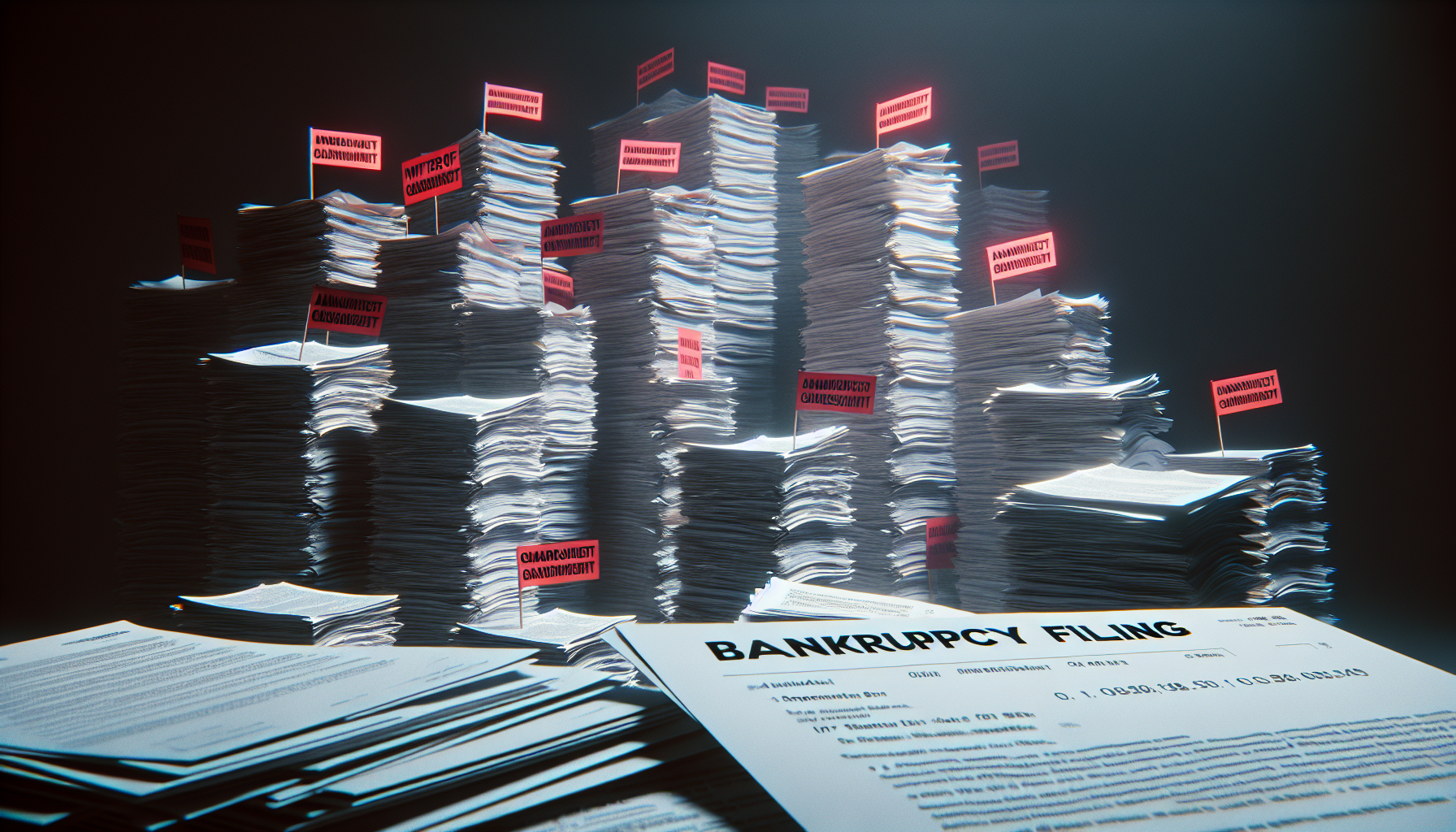
Embarking on the journey of overcoming financial challenges often involves comprehending elaborate concepts such as bankruptcy and wage garnishment. Bankruptcy, a legal course for debt relief, serves as a lifeline for individuals and businesses overwhelmed by debts.
Contrarily, wage garnishment, alternatively known as wage deduction, is a court-ordered protocol allowing creditors to deduct money straight from the debtor’s earnings for debt repayment.
Examining wage garnishment more closely, the debt relief process typically commences when the debtor defaults on their financial obligation.
A creditor can subsequently take legal action and, if victorious, the court issues an order sanctioning the wage deduction. Various instances can lead to wage garnishments, amongst them unpaid taxes, defaulted student loans, child support, and financial insolvency, which often forces individuals to seek debt relief options like filing for Chapter bankruptcy to reduce wage deductions.
Understanding Debt Relief and Its Role in Bankruptcy
Debt relief, initially understood as a form of financial lifeline, immensely supports individuals grappling with debilitating debt, thereby preventing creditor harassment. As indicated by the name, it offers various respite avenues like debt consolidation, a popular debt management tool.
Other forms of debt relief include credit counseling, repossession defense, and seen as a means of foreclosure prevention, all aimed at mitigating the impact of heavy debt.
Incredibly, debt relief’s instrumental role in bankruptcy proceedings cannot be understated.
It serves as pivotal support for individuals teetering on bankruptcy’s edge. More importantly, it acts as foreclosure prevention, shielding individuals from immediate asset loss.
From the point of view of bankruptcy, debt relief has a pronounced influence on wage deductions. It forms an essential link between creditor harassment and protective armor offered via bankruptcy. Interestingly, some debt relief forms, such as repossession defense, assist in situations like creditor harassment, debt consolidation, foreclosure prevention, and credit counseling.

Chapter Bankruptcy An Overview
Bankruptcy, an often complex legal method, provides relief for those overwhelmed by debt, like those grappling with the repercussions of a ‘collection lawsuit. ‘. When impending debt becomes unbearable, caused by unexpected scenarios such as medical emergencies, divorce, or unemployment, one might opt for bankruptcy.
It does provide a way out but can result in a ‘default judgment’.
Overwhelming debt is primarily why individuals or businesses contemplate bankruptcy.
Through this process, they can start anew, even though it may initially affect their credit ratings and property. More so, when faced with the threat of a collection lawsuit, bankruptcy seems like a plausible option.
Specific chapters exist under the Bankruptcy Code, tailored for unique financial predicaments. One such is ‘Chapter Bankruptcy’, known for its distinct solutions for severe financial circumstances. Predominantly, it proposes ‘debt settlement’ or a ‘consumer proposal’ as alternatives to a ‘collection lawsuit’, ‘default judgment’, or ‘bankruptcy discharge’.
Wage Deduction During Financial Insolvency
In cases of severe financial distress, such as encountering unsecured debts, wage garnishment may unfortunately become a reality. This situation typically arises when a debtor fails to meet credit card debt obligations, prompting creditors to lawfully seize part of their earnings.
Equally, individuals or businesses grappling with financial insolvency, a state characterized by an inability to clear debts, could find it challenging to keep up with mortgage payments.
The imposition of wage deductions tends to be a significant consequence of financial insolvency, thus forming a link with wage garnishment.
Nevertheless, mechanisms are available that can provide protection during such financially precarious times. For instance, one may explore insolvency protection measures that can successfully halt the garnishing of wages.
Such protective measures are crucial, particularly when dealing with medical bills or other pressing financial loads. They ensure that despite the burden of debt, the debtor can still manage unsecured debts, credit card debt, medical bills, student loans, and mortgage payments.
Creditor Harassment What Can Be Done
Creditor harassment is a pervasive issue impacting countless individuals grappling with the murky waters of debt recovery. This unpleasant predicament commonly encompasses unrestricted income withholding, insistent payment demands, and occasionally, the imposition of a bank levy.
Creditor harassment, by definition, entails the use of overbearing and improper tactics by creditors to retrieve debts.
These are often executed through a barrage of menacing phone calls and intimidating letters.
Extreme cases can even escalate to salary garnishment, causing further financial strain on the debtor.
Critically, specific behaviors are deemed illegal and breach the parameters established by laws, attracting serious repercussions for overzealous creditors.
Therefore, understanding your rights is vital when dealing with such predicaments.
A popular method to alleviate creditor harassment is initiating bankruptcy proceedings. The automatic stay provision comes into play during bankruptcy, presenting a significant barrier to most collection endeavors, including wage garnishment, bank levy, and income withholding, thereby hindering debt recovery and salary garnishment.
Repossession Defense and Foreclosure Prevention
Repossession and foreclosure are standard procedures, often initiated by a collection agency, when you fail to adhere to your loan repayment obligations. These legal processes signify defaulting on loan commitments, commonly triggered by unanticipated financial hardships.
Exempt assets often become a lifeline, serving as instruments to mitigate the impact of such financial strain.
Legally, they offer protection against potential wage deductions, shielding you from the added burden.
Engaging a well-versed lawyer to guide through these complexities can help preserve these assets.
In extreme cases, a bankruptcy petition might be a viable solution.
This aggressive decision can effectively stall repossession and foreclosure processes. While providing immediate relief, it transfers trusteeship of your assets to the court and could potentially damage your credit score.
Despite these drawbacks, bankruptcy can still serve as an effective defense against repossession and foreclosure. It can be a challenging process to navigate the exemptions for assets, dealing with the collection agency, filing the bankruptcy petition, understanding the trusteeship, and managing the impact on your credit score.
Credit Counseling and Debt Settlement: A Comparative Analysis
Navigating personal debt can seem overwhelming, especially amid economic uncertainty. Options like Credit Counseling and Debt Settlement are increasingly becoming popular financial lifelines.
Credit report analysis reveals that these strategies are crucial in managing debts effectively.
Credit Counseling offers a comprehensive assessment of your financial situation, assisting in debt management.
This approach can help lower your interest rates and create a tailored debt management plan. Nevertheless, it may not prevent Debt Collection activities and might not be applicable for all types of debts.
On the other hand, Debt Settlement focuses on negotiating with creditors, aiming to settle your debts for a lesser amount than owed. Although, this advantage is accompanied by potential drawbacks.
For instance, your credit report could sustain damage, and there could be unexpected tax consequences.
Comparatively, a closer analysis reveals that these two methods approach debt from different angles. While Credit Counseling suggests a systematic payment plan, it’s imperative to consistently check your credit report, stay mindful of bankruptcy court proceedings, understand the nuances of debt collection, adopt effective debt management strategies, and fully utilize unemployment benefits if necessary.
Navigating Personal Debt
- Credit Counseling provides a comprehensive assessment of your financial situation and can help lower your interest rates.
- Debt Settlement negotiates with creditors to potentially settle your debts for less than what is owed.
- Both Credit Counseling and Debt Settlement are increasingly popular strategies for managing debt effectively.
- Despite their benefits, both strategies come with potential drawbacks such as damage to credit report and unexpected tax consequences.
Impact of Bankruptcy Discharge on Unsecured Debts
The complex relationship between bankruptcy and unsecured debts, such as credit card bills or medical invoices, has many legal intricacies. Declaring bankruptcy is a legal mechanism designed to provide a fresh start by restructuring one’s financial obligations, including getting a tax refund.
To determine eligibility for bankruptcy, individuals must pass the Bankruptcy means test.
The Bankruptcy means test is designed to assess whether one can afford to pay their debts or if they qualify for a discharge.
Understanding the different types of bankruptcy, primarily Chapter 7 and Chapter 13, is crucial since these handle unsecured debts differently. This is particularly important as these debts do not have collateral offered.
During bankruptcy, the Bankruptcy trustee plays a crucial role. As the overseer of the insolvency proceedings, this trustee ensures all protocols are adhered to, preventing possible bankruptcy fraud. Unsecured debts undergo special treatment in insolvency proceedings, guided by the bankruptcy means test, and can be impacted by factors such as a tax refund, bankruptcy fraud, or the actions of a bankruptcy trustee.
Navigating Through Income Withholding and Salary Garnishment
Grasping the intricate relationship between income withholding and wage garnishment, as well as the role these can play in sparking financial distress, is essential when navigating these complex situations. Wage garnishment, a legal process where a portion of an individual’s salary is held back by their employer to settle a debt, can severely impact one’s financial health.
Eviction prevention measures often instigate wage garnishment, and it can also emerge as a consequence of unpaid child support dues.
The latter can cause significant financial distress, making it vital to understand the dynamics of such obligations.
Similarly, unpaid alimony payments or court judgments can lead to salary garnishment, creating a challenging financial environment.
To mitigate these challenges, debt restructuring mechanisms, such as filing for bankruptcy, can offer a lifeline. This process provides not just a means for loan modification, debt restructuring, and eviction prevention, but also potential relief from wage garnishment, child support, and alimony payments.
Wage Garnishment and Financial Distress
- Wage garnishment is a legal process where a part of an individual’s salary is withheld by their employer to settle a debt, which can severely impact their financial health.
- Eviction prevention measures and unpaid child support dues often lead to wage garnishment, causing significant financial distress.
- Unpaid alimony payments or court judgments can also result in salary garnishment, creating a challenging financial environment.
- Debt restructuring mechanisms, such as filing for bankruptcy, can provide relief from wage garnishment, child support, and alimony payments.

Get a Free Bankruptcy Case Evaluation